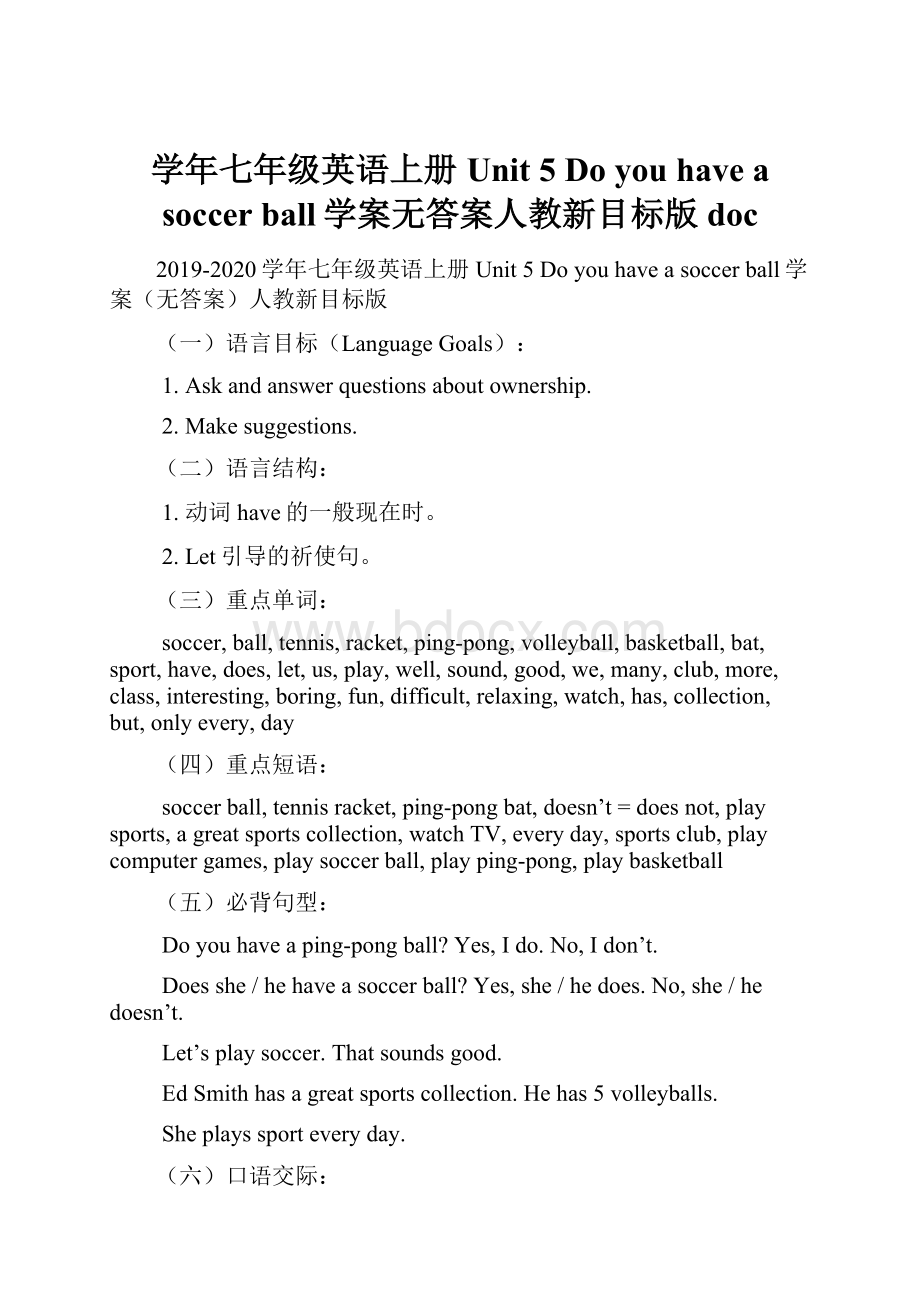学年七年级英语上册 Unit 5Do you have a soccer ball学案无答案人教新目标版doc.docx
《学年七年级英语上册 Unit 5Do you have a soccer ball学案无答案人教新目标版doc.docx》由会员分享,可在线阅读,更多相关《学年七年级英语上册 Unit 5Do you have a soccer ball学案无答案人教新目标版doc.docx(23页珍藏版)》请在冰豆网上搜索。

学年七年级英语上册Unit5Doyouhaveasoccerball学案无答案人教新目标版doc
2019-2020学年七年级英语上册Unit5Doyouhaveasoccerball学案(无答案)人教新目标版
(一)语言目标(LanguageGoals):
1.Askandanswerquestionsaboutownership.
2.Makesuggestions.
(二)语言结构:
1.动词have的一般现在时。
2.Let引导的祈使句。
(三)重点单词:
soccer,ball,tennis,racket,ping-pong,volleyball,basketball,bat,sport,have,does,let,us,play,well,sound,good,we,many,club,more,class,interesting,boring,fun,difficult,relaxing,watch,has,collection,but,onlyevery,day
(四)重点短语:
soccerball,tennisracket,ping-pongbat,doesn’t=doesnot,playsports,agreatsportscollection,watchTV,everyday,sportsclub,playcomputergames,playsoccerball,playping-pong,playbasketball
(五)必背句型:
Doyouhaveaping-pongball?
Yes,Ido.No,Idon’t.
Doesshe/hehaveasoccerball?
Yes,she/hedoes.No,she/hedoesn’t.
Let’splaysoccer.Thatsoundsgood.
EdSmithhasagreatsportscollection.Hehas5volleyballs.
Sheplayssporteveryday.
(六)口语交际:
talkaboutownership
Ihave...She/Hehas...
Doyouhave...?
Yes,Ido./No,Idon’t.
Doesshe/hehave...?
Yes,she/hedoes./No,she/hedoesn’t.
makesuggestions
Let’swatchTV/playping-pong/...
Thatsoundsgood/great/interesting/...
(七)疑难解析(KeyPoints):
1.怎样表达某人有某物:
※当你从地上拾到一支钢笔,你会情不自禁地问Whosepenisit?
这是谁的钢笔?
Isithers?
是她的吗?
前两个单元我们学了用物主代词表示所属关系,本单元我们将学会用have表示所属关系,have“有”,强调拥有或占有,是所属关系。
如:
Ihaveafather.Ihaveamother.
我有爸爸。
我有妈妈。
Ihaveafamily.
我有一个家。
谓语动词have在句中有两种形式,即have和has。
have用于第一人称的单数和复数(I、we),第二人称(you)和第三人称复数(they或其他复数名词等),has用于第三人称单数he,she,it或单数名词。
I/Wehaveacomputer.
我/我们有台电脑。
Youhaveacomputer.
你/你们有电脑。
They/JimandTomhaveacomputer.
他们/吉姆和汤姆有台电脑。
Kate/Shehasacomputer.
凯特/她有电脑。
2.动词have(有)的一般现在时:
(1)have是及物动词(vt.),后面接宾语,意为“有、拥有”。
用于肯定句时,如果主语是第三人称单数,have要变为has。
变为一般疑问句时,要在句首加助动词do或does(主语第三人称单数时为does),加does后动词还原,即用动词have。
如:
Ihaveabrother.
我有一个哥哥。
Shehasastorybook.
她有一本故事书。
(2)have的否定句,要在主语后,实义动词前加助动词don’t或doesn’t。
主语为第三人称单数需要加does,加does后动词还原。
如:
Ihavearacket.
我有一个网球球拍。
Idon’thavearacket.
我没有网球球拍。
Hehasacomputer.
他有一台电脑。
Hedoesn’thaveacomputer.
他没有电脑。
3.therebe与have的区别:
它们都表示“有”的意思,但句型Thereis/are...表示某处有某物或某人,强调的是一种客观存在;但是have强调的是拥有或占有,主语一般是名词或代词,与主语是所属关系。
Ihavetwobrothersandonesister.
我有两个兄弟,一个姐姐。
MysisterhastwotoysbutIhaveone.
我妹妹有两个玩具,而我只有一个。
※有时Therebe结构和have可替换。
Therearetwentyclassesinourschool.=Wehavetwentyclassesinourschool.
我们学校有二十个班级。
例:
看图,用方框中的词完成对话。
There’s,have,has,four,play,watch,bedrooms,There’re
Look!
We
(1)abigredhouse.Thehousehasthreebed-rooms(卧房).It
(2)anicewindow(窗户).Thishouse(3)twofloors(两层).(4)aTVinthesittingroom(客厅)。
(5)twobathrooms(浴室)inthishouse.There’satableand(6)chairsinthishouse.Thediningroom(餐厅)isverybig.Abigbirdisinthebathroom.We(7)TVinthesittingroom.Wehave(吃)breakfast,lunchandsupperinthediningroom.Wesleep(睡)inthe(8).Wewashfaces(洗脸)andhaveashower(洗澡)inthebathroom.Thehouse(9)agarden(花园),too.We(10)badmintoninit.Weloveourhouse.
【解析】此题主要考查英语中“有”的用法,therebe表示某处有什么。
have(has)表示某人有某物,另外,本题出现了三个动词短语:
playbadminton打羽毛球,watchTV看电视,havebreakfast/lunch/supper吃早/中/晚饭。
由上栏讲解及上下文的意思可知答案为:
(1)have
(2)has(3)has(4)There’s(5)There’re
(6)four(7)watch(8)bedrooms(9)has(10)play
注:
There’s=ThereisThere’re=Thereare
4.Let’splaybaseball.
我们打棒球吧。
这是一个以动词Let开头的祈使句,表示建议。
祈使句都是以动词开头,省略了主语。
Let’s是Letus的缩写形式,us意为“我们”,放在动词let后作宾语,它被称为代词宾格。
该句型结构为letsb.dosth.“让某人做某事”,表示说话人的建议。
对该祈使句所表示的建议肯定回答一般用OK./Allright./Yes,let’s...,否定回答一般用Sorry,I...等回答。
如:
5.祈使句
祈使句是英语的基本句型之一,表达说话人对对方的叮嘱、劝告、请求或命令等,往往有表示请求、命令、希望、禁止、劝告等意思。
※祈使句的肯定句式有三种形式:
(1)Do型(行为动词原形+副词),如:
Sitdown!
坐下!
Standup!
起立!
(2)Be型(连系动词be+表语,如形容词、名词等),如:
Bequiet!
安静!
(3)let型(let+人称代词的宾格+动词原形+其他成份)。
如:
Letmehelpyou.
让我来帮助你。
Letusplaybasketball.
让我们打篮球吧。
※Do型是最常见、最简单的一种结构。
Let型是本单元的重点。
(4)否定句式很简单,“Don’t”开头记心间。
※祈使句的肯定结构是以动词原形打头,否定结构是以“Don’t+动词原形”开头。
如:
Don’tgothere,please.
请别去那儿。
Don’tbelate.
不要迟到。
Don’tlethimin.
不要让他进来。
※let型祈使句分为两种情形,含第一人称和第三人称两种。
→含第三人称的祈使句的否定句在句首加Don’t,构成否定句。
Don’tlethim/her/it/themin.
别让他(她)(它)们进来。
→含第一人称主语(us,me)的祈使句的否定,否定式不是在句首加Don’t,而是这样构成:
Let’s(us,me)+not+动词原形……
如:
Let’snotsithere.
我们不要坐在这儿。
例:
根据题意或图示完成句子。
(1)A:
Havesometea,please.
B:
_________you.
(2)_________openthewindow.
(3)_________fight(打架),TomandBilly.
(4)Let’s_________________TV.It’sboring._______dance.
(5)________lettheboyruninthestreet.It’sdangerous.(危险)
Keys:
(1)Thank
(2)Don’t(3)Don’t
(4)not,watch,Let’s(5)Don’t
6.人称代词(小结):
表示“我”、“你”、“他”、“她”、“我们”、“你们”、“他们”的词,叫人称代词。
人称代词有人称、数和格的变化,见下表:
人称代词(PersonalPronouns)
※人称代词的一般用法:
→作主语(用主格)
Ilikebasketball.
我喜欢打篮球。
注:
I(我)无论放在句首、句中或句尾都要大写。
Heisareporter.
他是个记者。
→作表格(用主格,口语中常用宾格)
Whoisthere?
It’sme(I).
是谁啊?
是我。
→Letusgohome.
让我们回家吧。
(us作动词let的宾语)
Tomiswithus.
汤姆和我们在一块。
(us作介词with的宾语)
7.Thatsoundsinteresting.
那听上去很有趣。
在口语中,当你的朋友提出一些尚未实施的建议时,你做出针对该建议的个人观点时,用句型Thatsounds+形容词。
形容词的选用可根据个人观点。
褒义的评价可选用:
interesting,fun,relaxing,good,wonderful.
贬义的评价可选用:
boring,terrible,bad.
如:
Let’swatchTV.Thatsoundsbad.
that指前一个所提的建议,英语中指前面所述的内容或事情,通常用that而不是this。
that属第三人称单数,谓语动词sound后应加s。
sound在这里是连系动词,作“听起来……”讲,后面跟一个形容词作表语,如:
Yourideadoesn’tsoundgood.
你的主意听起来好像不行。
类似sound一样的连系动词有:
look(看起来……,显得……),taste(尝起来……),smell(闻起来……)。
如:
Thesongsoundsbeautiful.
这首歌听起来很优美。
Thatstorysoundsveryinteresting.
这个故事听起来很有趣。
Yourwatchlooksverynice.
你的手表很好看。
类似的表达法,lookhappy看上去很高兴,soundlike听起来像,looklike看起来像。
8.Wehavemanysportsclubs:
basketball,ping-pong,soccer.
many指代或修饰可数名词复数,much指代或修饰不可数名词,many和much的比较级都是more,此处more是many的比较级。
如:
Therearemanyballsonthefloor.
地板上有很多球。
Thereismuchmilkinthebottle.
瓶里有很多牛奶。
Ihavemanypicturebooksandhehasmore.
我有很多图书,他的图书更多。
9.interesting有趣的
interesting是形容词,表示某事物是令人感兴趣的、有趣的。
interested则表示人对事物感兴趣,后面常用in的介词短语。
如:
Thisgameisveryinteresting.
这活动十分有趣。
I’minterestedinsports.
我对体育很感兴趣。
10.Buthedoesn’tplaysports—heonlywatchesthemonTV.
他不进行体育活动——他只是在电视上观看体育节目。
(1)playsports意思是“进行体育活动”。
play作及物动词,可表示“打球、踢球”或“弹奏乐器”。
play作不及物动词,表示“玩、玩耍”之意。
playwith表示“玩某东西”。
如:
Doyoulikeplayingfootball?
你喜欢踢足球吗?
Theyplayontheplayground.
他们常在操场上玩。
Don’tplaywiththealarmclock.
别玩闹钟。
相关词组:
※playbaseball打棒球
动词play后面可接表示球类的名词,表示“打球”或“踢球”。
这些球类名词前不能加任何冠词。
可以说playfootball(踢足球),不能说playa(或the)football。
再如:
playbasketball打篮球
playvolleyball打排球
playfootball/soccerball踢足球
playtennis打网球
playtabletennis(ping-pong)打乒乓球
playbadminton打羽毛球
play还可以和其他的词搭配成短语。
如:
playcomputergames玩电脑游戏
playsports进行体育运动
词汇链:
player运动员playmate游戏伙伴、玩伴
※watch的用法,watch作名词时,是“手表”,其复数为watches。
watch作动词讲,意思是“观看、注视”,在英语中看电视和看比赛不用see,而用watch(第三人称单数为watches)。
watchsportsonTV在电视上看体育比赛
watchthefootballgame看足球比赛
watchTV看电视
※join:
参加、加入(某个组织、团体)
jointheWTO加入世贸组织
jointheParty入党
jointhebaseballclub加入棒球俱乐部
Pleasejoinus.一块参加我们的活动吧。
11.and、but和or的用法:
这两个词都是并列连词,用来连接并列关系的词组或分句,其用法如下:
※and意为“和”,多用在肯定句中列举事物,通常只在最后一个事物前用这个词。
如:
You,heandIarestudents.
你,我,他都是学生。
※or意为“或者”,多用于选择疑问句中。
如:
Isyourcoatbigorsmall?
你的上衣大还是小?
※在否定句中,表示并列部分的连词应单独使用or,若用and必须重复前面的否定句。
如:
There’snoairor(=andno)wateronthemoon.
月球上没有空气和水。
※but是表转折关系的连词。
如:
You’reateacher,butI’mastudent.
你是老师,而我是学生。
12.welcome的用法(You’rewelcome.)
Welcometooursportscenter.
欢迎到我们的运动中心。
※welcome在这里是感叹词,意思是“欢迎”。
welcometo...欢迎到某个地方来。
如:
WelcometoChina.
欢迎您到中国来!
※welcome还可用作形容词,意思是“受欢迎的”。
如:
Youareawelcomeguest.
你是受欢迎的客人。
※welcome作表语,You’rewelcome.的意思是“不用谢”,回答对方道谢时的常用语。
如:
Thankyouverymuch.非常感谢你。
You’rewelcome.不用谢(不客气)。
【模拟试题】(答题时间:
90分钟)
一.按要求变换词形。
(1)they(宾格)_________
(2)doesnot(缩写形式)_________
(3)have(第三人称单数)_________(4)Let’s(完全形式)_________
(5)our(人称代词主格)_________(6)relax(形容词)_________
(7)soccer(同义词)_________
二.单项选择
1.—Well,Let’splaycomputergames.
—That________good.
A.areB.soundsC.soundD.am
2.Therearefivepeopleina______team.
A.baseballB.basketballC.tennisD.volleyball
3.Theschoolplay(校园剧)isvery_________.Sowelikeit.
A.boringB.interestC.interestingD.difficult
4._________youhaveabaseballbat?
A.DoB.DoesC.AreD.Is
5.She_________anEnglish-Chinesedictionary.
A.isB.hasC.haveD.are
6.Lethim_________TV.
A.watchesB.lookatC.seeD.watch
7.She_________sportseveryday.Hermother_________TVeveryday.
A.plaies;watchesB.plays;watchs
C.plays;watchesD.play;watch
8.Let’s_________toplay_________football.
A./;/B.go;/C.go;theD./;the
9.—DoyouhaveacolorTVset?
—________.
A.Yes,wehave.B.No,wehaven’t.
C.Yes,wedo.D.Yes,weare.
10.—Let’swatchTV.
—No,please.Thatsounds_________.
A.boringB.broingC.interestingD.good
11.Weneedoneping-pongballandtwo_________.
A.ping-pongbatB.ping-pongsbat
C.ping-pongbatsD.ping-pongsbats
12.Mymotherlikesvolleyball.Shethinksitis_________.
A.funB.difficultC.boringD.health
13.—_________he_________anybaseballs?
—Yes,hehasone.
A.Does;haveB.Does;has
C.Do;haveD.Do;has
14._________HarryandMikelikecomputergames?
A.AreB.DoC.DoesD.B或C都可以
15.Myfatherhasasmall_________collection.
A.sportB.sport’sC.sports’D.sports
16.Iliketowatchfootballgames_____